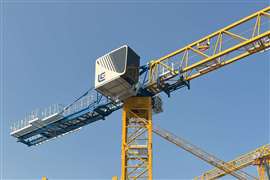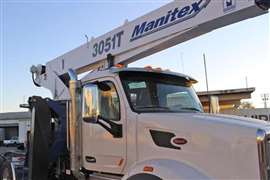Mark Hodgkins of ArcGen Hilta on the company's ambitious growth strategy
10 November 2011

ArcGen Hilta has been adding products to its range and acquiring companies. Murray Pollok met ArcGen’s chief executive Mark Hodgkins and asked about the long term strategy for the UK company.
It isn't uncommon for companies to set themselves ambitious growth targets; it's just that it is a lot easier to set targets than reach them. So when Mark Hodgkins, chief executive of UK-based ArcGen Hilta, tells IRN that he wants to triple revenues by 2015, with half generated outside the UK (compared to just 5% now), you are bound to respond with a simple question. How?
Well, there is a clue in his own background. Before joining Morris & Co, the family owned business that acquired ArcGen in 2006, Mr Hodgkins spent eight years as a mergers and acquisitions specialist with Ernst & Young. That expertise is evident in the way that ArcGen has changed since Morris took over.
Historically, the company was very strong in selling ArcGen branded welding sets in the UK and Ireland (supplied by Japanese manufacturer Denyo) and well as being Allmand's UK/Ireland agent for its lighting towers.
However, Mr Hodgkins says Morris acquired ArcGen in 2006 because it could see a real opportunity; "It was well run, but there was a lack of marketing and investment - it could have been a much bigger business. The first strategy was that we wanted to sell more products to the existing customer base."
That meant more acquisitions. Next up, in March 2008, was UK pump and pressure washer manufacturer Hilta. "After 12 months it didn't look like the greatest thing we had done, but now, it looks like it has paid off", says Mr Hodgkins, "In the last nine months Hilta has done better than ArcGen." He says Hilta now represents around half of all turnover (which is in the £5 to £10 million range), up from 30% at the time of the acquisition.
The acquisition of lighting tower and genset supplier SMC followed last summer. "Assets are well priced now", Mr Hodgkins tells IRN, speaking in ArcGen's Perth office in Scotland, "It wasn't doing well, but not in a ‘near death' situation. They had good products, but it lacked investment and marketing and sales".
Mr Hodgkins says ArcGen, Hilta and SMC had all been starved of investment. While the company had to cut its costs - the workforce dropped from a peak of 60-65 before the recession to nearer 45 people - it invested in nine full time sales people and started to attend exhibitions again; 14 in the last year and a half.
"We're massively changed", he says, "This has brought profits down below what the vendors had, but we are investing in a long term future."
The SMC acquisition may have caused some confusion among UK customers, because ArcGen was already selling lighting towers through its agreement with US manufacturer Allmand. "I felt that SMC made very good products and competed well with any other lighting tower in the world", explains Mr Hodgkins, "So why not try to have control of your own brand? We don't have control of the Allmand brand."
He says ArcGen continues to sell Allmand towers in the UK; "We have a number of customers who like the Allmand product. We have a very, very good relationship with Allmand." He adds; "I can live with the ‘grey' - you have to sometimes."
In addition to the Hilta and SMC acquisitions, ArcGen has added other products in the UK, including BBA pumps from the Netherlands and Addco variable message boards.
If pushing more products through the UK operation is one aspect of the growth strategy, then increasing exports is the other, with the SMC towers and its international dealers playing an especially important role.
"The longer term plan is to make the business grow at least three times by 2015. I think it's doable, with exports being 50% of the whole", he says. "The Hilta and SMC products are well suited to developing economies. And if you go to distribution with a bigger selection of products, it makes you more interesting."
ArcGen is now selling towers to customers in Australia, South Africa, Mozambique and the Netherlands, among others. PremiAir Services in Australia, which has a fleet of 195 SMC towers, is "a cornerstone customer to us" says Mr Hodgkins, "they are very important."
He says he will be disappointed if exports don't reach a quarter of sales in 2011, up from just 5% in 2010.
Of course, not all the ArcGen product range will be available for sale outside the UK and Ireland. ArcGen can sell the Denyo generators in the UK and Ireland only, and it is the same situation with the BBA pumps and the Addco message boards. For the ArcGen welders (supplied by Denyo), it needs to seek permission from Denyo for exports.
That means the export focus will be on the SMC lighting towers, TW pressure washers and Hilta pumps. There may also be further acquisitions in related sectors, but these are unlikely to be "transformative", says Mr Hodgkins.
If all of the above paint a picture of a back-office manager more interested in deal-making than products, then that would be quite wrong. He talks knowledgeably and enthusiastically about machines - a reflection of his wide and almost constant travelling to trade shows and customers - and has very strong views about how the SMC business and its products should develop.
"I want SMC to be in quality products", he says, in line with the Denyo gensets and ArcGen branded welder units, which have very good reputations for quality.
His primary aim is to create lighting towers that share some of the long-wearing characteristics of the Japanese products. "I want the towers to last a long time, and for them to be capable of remanufacturing, and to be 95% recycled. We're not there yet - we are there with the Denyo - they will last for 20 years. I'd like to have lighting towers lasting for 10-12 years and not the current 5-7 years.
"If you are serious about environmental impact, then that is the only way to go. The products might be more expensive on day one, but look at the whole life costs."
He thinks a degree of scepticism is required when talking about the demands of rental companies for environmentally friendly products; "Does the rental industry really buy the most environmentally friendly machine, or does it buy the one that is cheaper that says it is environmental?"
The new, more durable versions of the SMC lighting towers could be available later this year.
Also planned is a range of specialty gensets under the SMC brand. SMC previously sold Spanish-built Himoinsa gensets, but Mr Hodgkins says his plan is for SMC to develop a new range of its own niche sets, in a couple of year's time.
More immediately, ArcGen will have a new Denyo ultra-quiet genset to market later this year (see box story) and an electrically powered welding unit, the first non-diesel driven welder from the company (and not made by Denyo).
The key thing, he says, is that Morris & Co is in the business for the long term, and that doesn't mean 10 years. "We have a philosophy of holding on to companies for a very long time indeed - 50 years is the average", he says, "We take long term decisions".
Denyo expands ultra
silent genset range
Denyo Europe BV is to extend its range of ultra silent gensets this year with the launch of a 100 kVA unit to add to the 20 and 37 kVA units already available.
Yosuke Matsumoto, general manager of sales for Denyo Europe, told IRN that Denyo was "targeting a sound level around 85 LWA dB for the 100 kVA unit, and we're confident that we can achieve that."
The very low sound level - output is even lower at 80 and 82 LWA respectively for the 20 and 37 kVA models - is achieved by fitting an extra cooling fan driven by the alternator. This double fan arrangement allows Denyo to use a thick sound proofed canopy without overheating the engine.
Although more expensive than standard units - there is a price premium of around 30% - the lower noise is an enormous benefit for contractors working on city centre sites or for use at outdoor events. The 100 kVA unit is currently being developed in Japan and will use an Isuzu engine.
Denyo has a long history of selling generators in Europe. It has been selling welder units to its UK dealer ArcGen for around 30 years and for a decade up to 1995 was producing gensets for Atlas Copco. It now sells through its own European subsidiary and via distributors, including ArcGen Hilta.
Mr Matsumoto says Denyo generators, although at a premium price, offer unique benefits, including a 10 year working life with good residual value, and technical benefits related to the use of Denyo's own alternator.
Its alternators have three patented features: open delta windings protect the windings when the genset is only partially used with a three phase supply; a skewed winding arrangement in the armature core creates a very stable voltage; and the use of damper windings ensures the genset achieves its full rated output.



